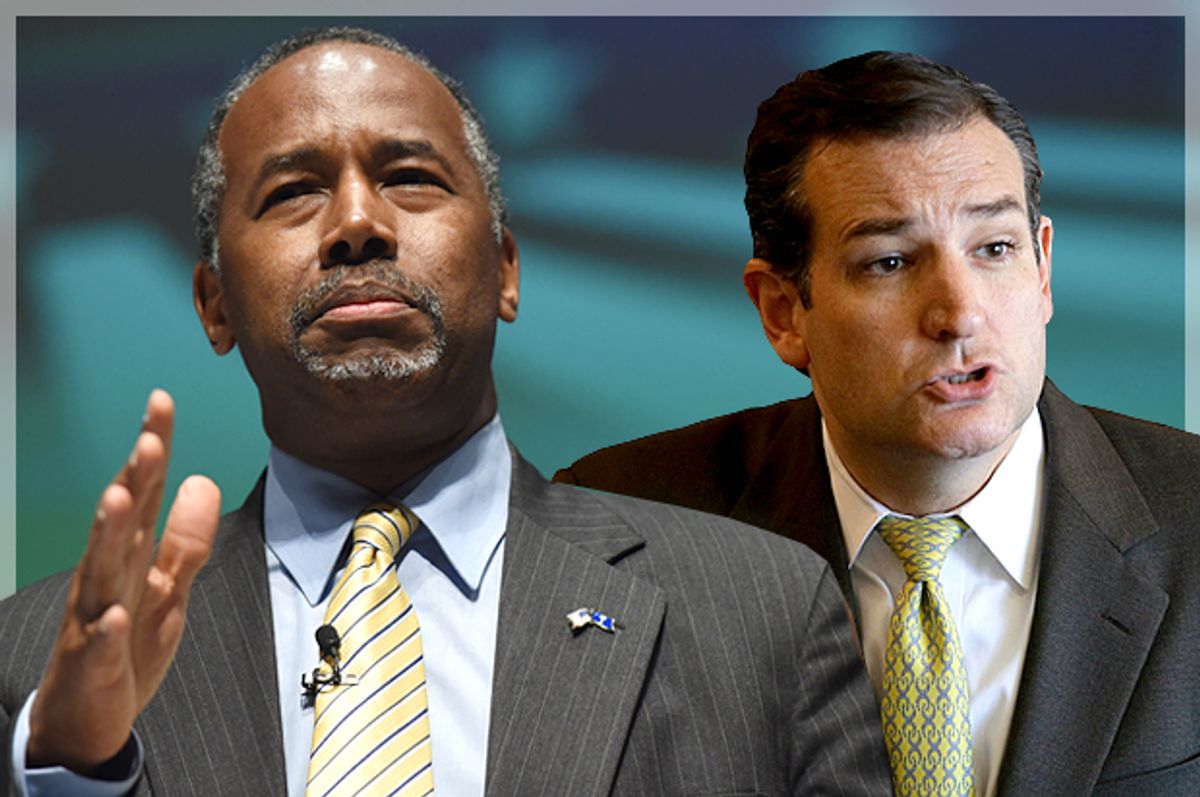Observers on the left and right have wrung their hands over what happens to a party that doubles down on the biases of older white men: As the nation gets more ethnically diverse, and more young people vote, groups like the “coalition of the ascendant” that elected Barack Obama will leave the GOP in the dust.
Okay, it’s not quite that simple, and it’s less true in local and off-year elections. But it’s likely — short of a major demographic reversal — to make the presidency increasingly hard for the Republicans to land. And recent events show that another big Republican commitment could spell long-term problems for the party of the right: The repeated bashing of non-Christians, especially atheists.
The latest is a statement by Ted Cruz that not only should an atheist not be president, he or she should start the day in prayer. "Any president who doesn't begin every day on his knees,” Cruz said at a religious gathering in Iowa, “isn't fit to be commander-in-chief of this country.”
This is of course weird for a bunch of reasons, especially the wariness that our early presidents — who had seen Britain and Europe thrown into relentless religious wars — held toward tangling religion and politics. Or Thomas Jefferson’s skepticism (“Question with boldness even the existence of a God; because, if there be one, he must more approve of the homage of reason, than that of blindfolded fear”), the warnings of George Washington and James Madison, and so on.
It’s tough to know how personal this issue really is for Cruz; his father is an evangelical minister, but the candidate is likely pandering to what remains a serious GOP constituency. Either way, it follows a now notorious comment by Ben Carson about Muslims being unfit for the presidency. “I would not advocate that we put a Muslim in charge of this nation. I absolutely would not agree with that,” he said, adding that "Some people have said it already happened.” Carson is probably being purely sincere here — as crazy as he is, he clearly has deeply held beliefs in a way that a lot of politicians don’t.
Americans — including liberal and progressive Americans — are hardly unanimously excited by the hard-line atheism of Sam Harris and Christopher Hitchens. And the number of agnostics and atheists in the nation today — seven percent total — are not likely to bend an election either way. There are not enough Muslims in the U.S. for that kind of dismissal to doom Carson.
But a full 23 percent of the country, according to a Pew Research Center survey, describe themselves as religiously “unaffiliated” — that number is up steeply from an earlier poll. And a decent number of them are likely religious skeptics who just don’t want to commit to a label like atheism. (The same survey showed the percentage of Christians declining eight points in seven years.) Others — even religious people — are going to offended by the blanket dissing of the unchurched.
And a Gallup poll from June showed that 58 percent of Americans don’t mind an atheist president. That leaves a lot of people voting against one, but that percentage is up four percent over three years. If numbers keep moving up at that pace as the country gets more socially liberal -- as it has on gay rights and medical marijuana -- it's not long before the Cruz line seems like a weird, retro kind of bigotry.
But Republicans keep doubling down on their evangelical base — and they probably have no choice. For now, they’re locked in on the issue and the candidates often one-up each other with intolerant statements. That’s fun on Fox News, but as a longterm structure — candidates not budging as voters ease up — the Republicans could have a slow-motion disaster on their hands.

Shares